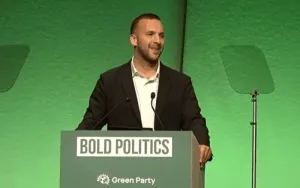The new House of Commons looks set for a small increase in its disability representation, with at least three new disabled MPs winning seats in last week’s general election.
Of the 650 MPs elected last week, there may now be at least nine who identify as disabled people – compared to possibly as few as five in the last parliament – with further MPs who self-describe as disabled likely to emerge in the coming months.
There are at least three new disabled MPs: Dr Marie Tidball, who was elected for Labour in Penistone and Stocksbridge; the Liberal Democrat Steve Darling, elected in Torbay; and Labour’s Jen Craft, who overturned a large Conservative majority in Thurrock.
Tidball is a disability rights activist, a legal researcher, and an experienced Labour councillor, and has a law degree, a masters, and a doctorate in criminology, from the University of Oxford.
During the pandemic, she spoke out repeatedly about the disproportionate number of deaths of disabled people from Covid, as coordinator of Oxford University’s Disability Law and Policy Project.
Early in the pandemic, she edited a report which showed that the government’s policy-making had breached its duties to disabled people under both the Equality Act and the UN Convention on the Rights of Persons with Disabilities.
She also accused the Conservative government of failing to “fulfil its national and international human rights obligations to disabled people” during the pandemic.
She later edited another report that found that the government’s National Disability Strategy had failed to address the “urgent challenges” posed by climate change and the COVID-19 pandemic.
She won Penistone and Stocksbridge last week with a 10 per cent increase in the vote share.
She told Disability News Service (DNS) yesterday (Wednesday) that she was feeling “elated” and “really happy” with her victory after “two years of hard work”.*
She said she had felt “really uplifted” by the efforts made by House of Commons staff and authorities to ensure the induction process for new MPs was accessible to her.
Tidball said she saw part of her role as being “visible” as a disabled MP.
She said: “I very much feel 14 million disabled people stood behind me.
“There was David Blunkett when I was growing up, and a couple of other Labour MPs, but it was knowing that there was someone like David in the House of Commons at that time, who had a disability, that made me think, maybe one day I could do that.
“And I really want disabled people of all age groups to see this and go, ‘Maybe one day I could do this too.’”
Darling also has a background as a local councillor, and led Torbay council for four years, as well as spending 18 years working for the former Liberal Democrat MP Adrian Sanders.
He overturned a Conservative majority of more than 17,000 at the 2019 election to win by more than 5,000 votes.
Darling is blind, and has a guide dog, Jennie, now set to become a familiar feature of the Commons chamber.
Craft won the Thurrock seat by more than 6,000 votes from Reform UK, beating the previous Conservative MP Jackie Doyle-Price, a former minister who was defending an 11,000 majority, into third place.
Last year, Craft told Centenary Action – which campaigns for a gender equal parliament by 2028 – that she was “really passionate about SEND issues and disability rights”.
She described herself as “a stay-at-home mum and carer for my disabled daughter”, and added: “It’s very easy to overlook the role of an unpaid carer but it’s taught me a hell of a lot more than all of my other jobs.”
She told Centenary Action: “I am disabled myself, with long term mental health issues, and reform of the mental health system is long overdue.
“I feel like things have gone backwards for disabled people with funding cuts and a lack of access. I will definitely take this up and campaign on it if I’m elected.”
Another new MP, Labour’s Liam Conlon, has spoken of becoming disabled following an accident when he was a teenager, and being unable to walk for four years, before he had extensive surgery and a hip replacement.
Although it is not yet clear if he currently identifies as a disabled person, he told a news organisation last year: “I know from using a wheelchair as a teenager the indignity of not being able to access public transport, and how it limits disabled people’s opportunities to find work, and it is a key driver of social exclusion for disabled people.
“It’s why if I am elected, I am promising to set-up the first ever all-party parliamentary group on transport accessibility within 100 days of becoming an MP – and I want that change to start in south London.”
Conlon won the Beckenham and Penge seat with more than 25,000 votes, and nearly 50 per cent of the vote.
For Labour, Emma Lewell-Buck, Marie Rimmer and Marsha de Cordova, who have all previously identified as disabled people, were re-elected.
Labour’s pre-election shadow minister for disabled people, Vicky Foxcroft, who confirmed shortly before the election that she now identifies as a disabled person, was re-elected and won the Lewisham North seat with more than 25,000 votes.
But due to her appointment as a government whip, she will not be able to speak out on disability issues in parliament, despite her experience as shadow minister and her popularity among the disabled people’s movement.
For the Liberal Democrats, Daisy Cooper, the party’s deputy leader, has previously spoken of having a long-term health condition and told Channel 4 News reporter Ruben Reuter in a pre-election interview – when asked how many disabled candidates her party had – that she had “a hidden disability”.
Of those disabled MPs who lost their seats last week, Conservative Paul Maynard was heavily beaten in the new Blackpool North and Fleetwood constituency, while another leading disabled Conservative and former minister, Robert Halfon, did not seek re-election.
Among other disabled candidates who fought the election, Emily Brothers, who would have become the first disabled trans MP if she had been elected, was beaten into fourth place in a tightly-fought Isle of Wight East seat, behind the Conservatives, Reform UK and the Green Party, but still secured more than 6,000 votes.
Kim Marshall came second for the SNP in Dumfriesshire, Clydesdale and Tweeddale, behind the Conservatives, securing 10,757 votes.
Jody McIntyre, a candidate for George Galloway’s Workers Party of Britain, came within about 700 votes of defeating Labour’s Jess Phillips in Birmingham Yardley.
Katharine Macy came fifth for the Liberal Democrats in Colne Valley, with 4.3 per cent of the vote, while Richard Whelan came fifth for the party in Basingstoke, with 6.5 per cent of the vote.
Sara Nicola Ruth came fifth for the Greens in Colchester, with 5.4 per cent of the vote, while Mags Lewis, the party’s disability spokesperson, came seventh for the party in Leicester East, but still claimed 4.6 per cent of the vote in a seat in which two former Labour MPs were standing against their former party.
Independent candidate John Urquhart came eighth in Cardiff West, with 0.5 per cent of the vote.
*DNS will publish a full article based on the interview with Marie Tidball next week
Picture: (From left to right) Jen Craft, Marie Tidball and Steve Darling
A note from the editor:
Please consider making a voluntary financial contribution to support the work of DNS and allow it to continue producing independent, carefully-researched news stories that focus on the lives and rights of disabled people and their user-led organisations.
Please do not contribute if you cannot afford to do so, and please note that DNS is not a charity. It is run and owned by disabled journalist John Pring and has been from its launch in April 2009.
Thank you for anything you can do to support the work of DNS…

 Ministers leave door open to continuing ‘absolute scandal’ of inappropriate Mental Health Act detention
Ministers leave door open to continuing ‘absolute scandal’ of inappropriate Mental Health Act detention Greens show contrast with other major parties on disability cuts and refusal to stir up hostility to claimants
Greens show contrast with other major parties on disability cuts and refusal to stir up hostility to claimants Minister admits signing off on order that led to widespread cuts to Access to Work
Minister admits signing off on order that led to widespread cuts to Access to Work